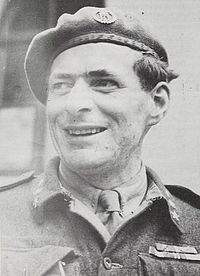Erik Gjems-Onstad
|
Erik Gjems-Onstad MBE |
|
|---|---|

Erik Gjems-Onstad in May 1945.
|
|
| Member of Parliament № 9 for Akershus |
|
|
In office 1973–1977 |
|
| Personal details | |
| Born |
22 February 1922 Kristiania, Norway |
| Died | 18 November 2011 (aged 89) Bærum, Akershus, Norway |
| Nationality | Norwegian |
| Political party |
Conservative Party (1960–64; c. 1988; 2005–07) Anders Lange's Party (1973–76) Independent (1976–77) Stop Immigration (1988–90) Fatherland Party (1991) Pensioners' Party (2007) |
| Other political affiliations |
Libertas Folkebevegelsen mot innvandring Stop Islamisation of Norway |
| Spouse(s) | Borgny Pedersen, 1949–73 (divorced) Inger Opseth, 1974–2011 (his death) |
| Children | Three |
| Profession | Lawyer, officer, politician |
| Awards |
|
| Military service | |
| Allegiance |
|
| Service/branch | • Norwegian Independent Company 1 (1941–45) • Norwegian Home Guard (1947–59) • Strike Command Southern Norway (1970–80) |
| Rank | • Second Lieutenant in 1944 • Captain in 1947 • Colonel in 1970 |
| Battles/wars | Second World War • Occupation of Norway by Nazi Germany |
Erik-Ørn Gjems-Onstad, MBE (22 February 1922 – 18 November 2011) was a Norwegian resistance member, officer, lawyer, sports official, politician, author and anti-immigration activist.
Gjems-Onstad joined the Norwegian resistance movement after Nazi Germany invaded Norway in 1940. He was arrested in Sweden for his involvement with Norwegian resistance activity in the country in 1941, and was sent to the United Kingdom where he joined the Norwegian Independent Company 1 (Kompani Linge) and received British military training. He was deployed to Norway in 1943 as part of Lark, assigned with establishing radio connection with London. He led Lark in Trøndelag between 1943 and 1945, which constituted the leadership of Milorg in the region. His other activities included to assist with weapons smuggling, prepare the sinking of the German battleship Tirpitz and plotting to assassinate Nazi collaborator Ivar Grande. He also founded the Durham organisation for conducting psychological warfare towards the end of the war, and he took part in blowing up railway tracks. Gjems-Onstad's efforts during the Second World War led him to become one of Norway's highest decorated war heroes.
He joined the Norwegian Home Guard after the war, where he served as a captain. He completed education in law, and also worked as a judge and lawyer. He ultimately reached the rank of colonel in the military, as military lawyer of a branch of the Royal Norwegian Air Force. For some years he was CEO of a project that planned to develop the Vaterland neighbourhood in Oslo. Gjems-Onstad also had a career in sports, representing the sports club SK Rye in cycling and racewalking. He later worked as a sports official as board member and chairman of various national sports bodies.
...
Wikipedia
